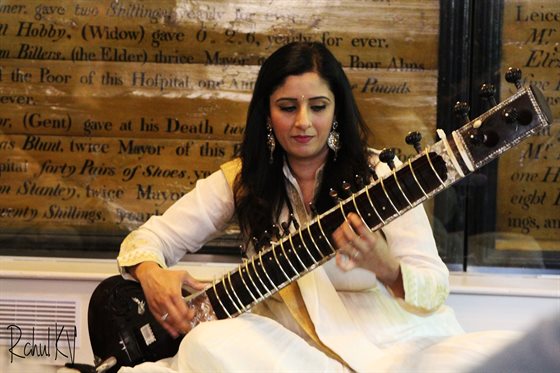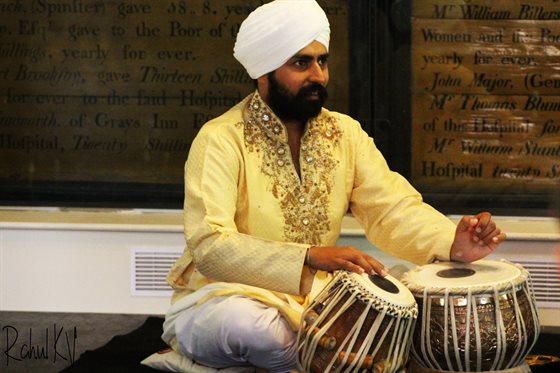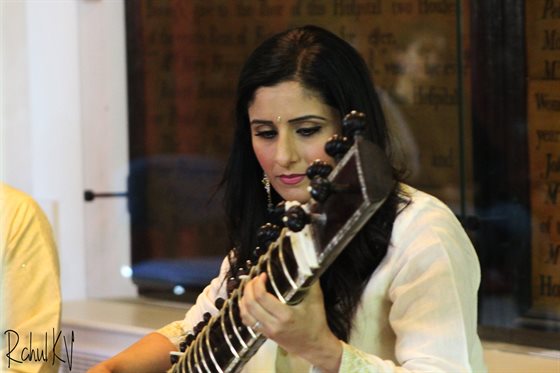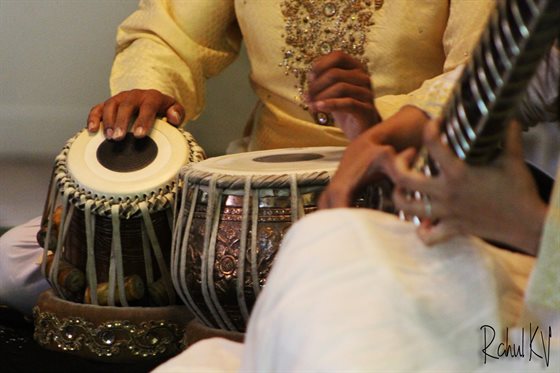Two of the world’s leading Indian Classical Musicians received a standing ovation after a flawless performance at De Montfort University Leicester (DMU) last week.
The highly regarded Roopa Panesar and Surdarshan Chana performed for an hour to a packed out Trinity House Chapel for the return of the recently introduced Lunchtime Indian Classical Music Series.

(Photo by Rahul Kizhakkeveettil)
The concert on Wednesday 7 June is the second instalment in a three part series formed by DMUmusic in partnership with the celebrated Darbar Festival, held on London’s Southbank every November.
The concerts open to DMU staff, students and the local community aims to bring a unique musical genre to new audiences, inspiring thoughts and relaxing the mind.
The performance followed the launch of the series by Harjinderpal Matharu and Shahbaz Hussain back in April at the Church of St Mary de Castro.
Following the concert, DMU’s Head of Music Chris Heighton, invited questions from the floor to the two star performers, opening a discussion about their unique genre of music.
Roopa said: “One way of describing our music is like painting a picture, with fixed and improvised elements, which when combined creates the various layers.
“The purpose of the music is to connect spiritually through sound energy, which is why we have a constant sound with very little silence.
“It is great to hear following our performances that other people are connecting spiritually and emotionally with the music you are creating.”
RELATED NEWS
Northern India comes to DMU for lunchtime music series
Emerging jazz band announced for DMU's international series
Beethoven 9 concert to mark DMU Orchestra's first birthday

(Photo by Rahul Kizhakkeveettil)
Roopa played the sitar a string instrument while Surdarshan played the tabla a percussion instrument similar to bongos.
The Leicester-born Roopa has toured the UK, Europe and the US performing at a number of prestigious venues and festivals.
She performed at a debut tour of India in 2014 where she had the honour of being praised by spiriting master and eminent musicians.
When asked about how she learnt to play, Roopa said: “I was very lucky that I grew up in Leicester and started learning at the age of 7 through the Leicester School of Music.
“It is traditional to end with an extremely fast ending where throughout you build up a rhythm and keep in time with each other to create the best impact for the crescendo.”

(Photo by Rahul Kizhakkeveettil)
Speaking about the kind of venues the pair usually play in, Roopa said: “Trinity Chapel is as near to traditional as we could get as we are playing acoustically as we normally play with microphones which isn’t traditional of this music at all, so it’s quite rare.
“Ultimately the purpose of the music is to connect spiritually and connect through sound energy, which is why we have a constant sound with little silence. It is so much worthwhile performing if people connect with it and feel moved by the music you are creating.
“This particular piece is quite mellow which anciently is supposed to have cooling effects from the heat of the day, which is why it is traditionally played in the afternoon.”
During the post-concert Q+A, Surdarshan who has performed for a while with Roopa and is a close friend, spoke about the spiritual connectivity of the music.

(Photo by Rahul Kizhakkeveettil)
He said: “Roopa leads and I accompany her and throughout we make everything up, whilst maintaining the main beats and try to meet the rhythm at the right point.
“Practicing with each other and getting to know each other and how one another think, is how we work.
“Each musician and artist tries to capture spirituality throughout pieces and that’s where this genre of music all started really, by connecting. The music is like an offering to god.”
The final concert of the 2017 musical programme will be on Tuesday 7 November featuring Debasmita Bhattacharya (Sarod) and Gurdain Rayatt (Tabla).
Posted on Tuesday 13 June 2017